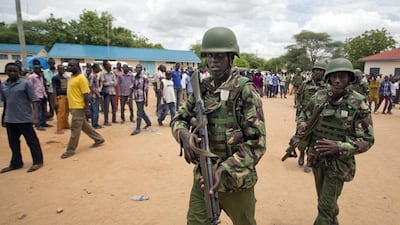NAIROBI // Kenyan fighter jets bombed two camps of the Al Qaeda-linked Shabab insurgents in southern Somalia on Monday, days after the militants carried out their worst ever massacre in Kenya.
“We bombed two Shabab camps in the Gedo region,” Kenyan army spokesman David Obonyo said.
“The two targets were hit and taken out, the two camps are destroyed.”
The air strikes follow threats by president Uhuru Kenyatta that he would retaliate “in the severest way possible” against the Shabab militants for their attack on Thursday on a university in Kenya’s northeastern town of Garissa in which nearly 150 died.
There was no information given as to casualties in the bases hit.
The Shabab gunmen launched the predawn attack in Garissa, storming dormitory buildings before lining up non-Muslim students for execution in what Mr Kenyatta described as a “barbaric medieval slaughter”.
The massacre, Kenya’s deadliest attack since the 1998 bombing of the US embassy in Nairobi, claimed the lives of 142 students, three police officers and three soldiers.
Kenyan aeroplanes have made repeated strikes in southern Somalia since their troops crossed into their war-torn neighbour in 2011 to attack Shabab bases, with Nairobi later joining the African Union force fighting the extremists.
“The bombings are part of the continued process and engagement against Al Shabab, which will go on,” Mr Obonyo added.
The Shabab fled their power base in Somalia’s capital Mogadishu in 2011, and continue to battle the AU force, Amisom, sent to drive them out that includes troops from Burundi, Djibouti, Ethiopia, Kenya and Uganda.
Kenya has struggled to stop the flow of Al Shabaab militants and weapons across its porous 700km border with Somalia.
Al Shabaab militants have killed more than 400 people in Kenya since April 2013.
The group has carried out a string of revenge attacks in neighbouring countries, notably Kenya and Uganda, in response to their participation in the AU force.
On Saturday, Shabab warned of a “long, gruesome war” unless Kenya withdrew its troops from Somalia, and threatened “another bloodbath”.
Shabab fighters also carried out the Westgate shopping mall attack in Nairobi in September 2013, a four-day siege which left at least 67 people dead.
Five men have also been arrested in connection with the university attack, including three alleged “coordinators” captured as they fled towards Somalia, and two others in the university.
The two arrested on campus included a security guard and a Tanzanian found “hiding in the ceiling” and holding grenades, the interior ministry said.
A US$215,000 (Dh789,700) bounty has also been offered for alleged Shabab commander Mohamed Mohamud, a former Kenyan teacher said to be the mastermind behind the attack.
* Agence France-Presse, additional reporting from Reuters

